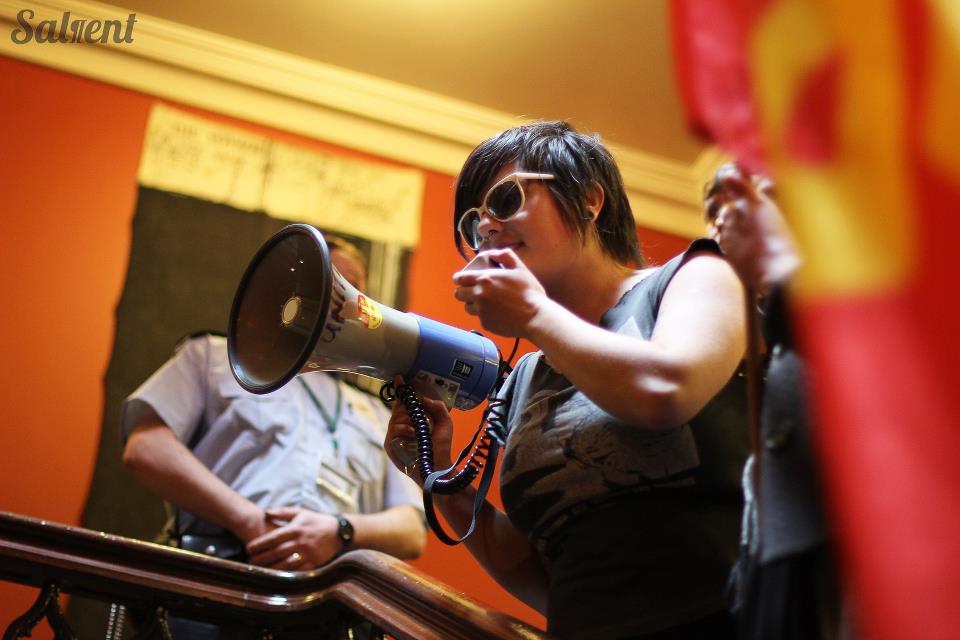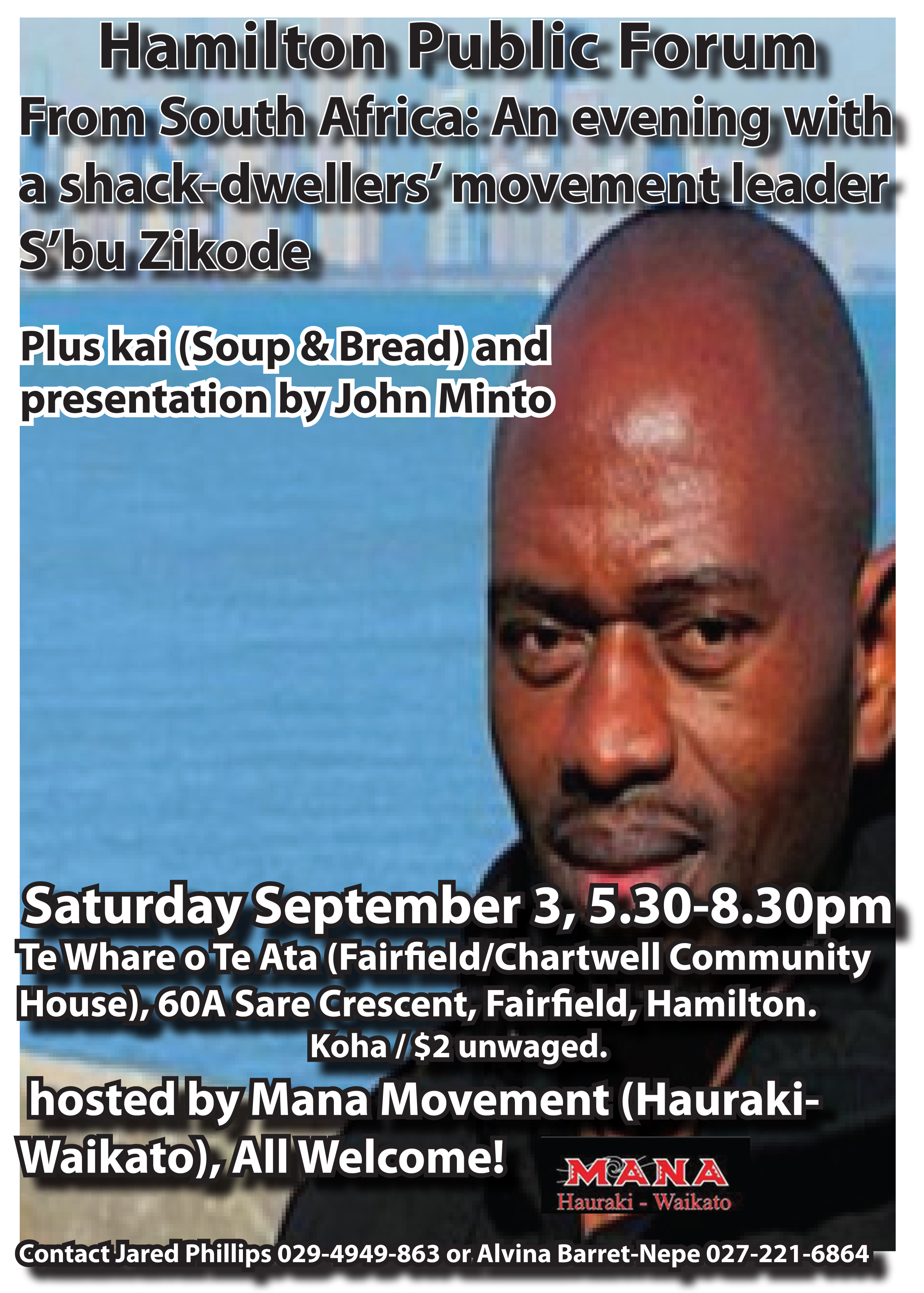This article was originally printed in the Spark December 2010, at a stage when the Workers Party Wellington branch was reconsidering its involvement in Students Assocations. We reprint it now in the lead-up to the VSM bill’s passage on September the 28th and in light of increased student militancy, with significant actions in Auckland and Wellington.
Joel Cosgrove (Wellington Workers Party member and former president of Victoria University Students’ Association).
The Education (Freedom of Association) Amendment Bill is making its way through parliament to make student union membership voluntary. Most people will be totally unaware of the bill and what it means, and may be thinking, “Anyway Freedom of Association is a good thing, isn’t it?”
Background
Currently any student studying at a polytech or university is automatically a member of their student association. A student association levy is generally charged to cover student union running costs, and these range between approximately $75 and $150 per year. Students can opt out of their membership but only upon reasons of hardship or conscientious objection. With a conscientious objection opt-out they are still liable to pay their membership levy.
On-and-off, since the 1970′s, this point of compulsion has waxed and waned as a political issue. Since the 1990s the issue has generally excited the membership of the youth and student wings’ of both the ACT and National parties. National MP Tony Steel brought forward a VSM bill in 1998 that brought about a nationwide referendum in every tertiary institute on the issue of whether student associations would stay “compulsory” or go “voluntary”. The only tertiary institute that went “voluntary” was Auckland University. Many institutes (including Victoria and Otago Universities) voted over 70% to stay “compulsory”. The difference with the current law is that it offers no choice to students on the issue. Funnily enough, students as a whole have voted to remain “compulsory”. “This Bill is an ideological solution in search of a problem. It is bad policy to impose such upheaval and chaos when there are many bigger issues facing the tertiary sector and New Zealand at present,” Said David Do, 2010 Co-President of the New Zealand Union of Students’ Associations. “Generations of students have enjoyed the services and opportunities provided by associations, and this shouldn’t be taken away from future students,” says Pene Delaney the other 2010 NZUSA co-President.
While the co-Presidents are correct, the ‘end of nigh’ predictions put forward are also unlikely to come about. The reality is that the bill is being put forward as an ideological back pat to the ACT Party (whose bill this is) and a sop to the youth wing of the National Party. Compromise was apparently agreed on to make it easier to opt out politically, but fraudulence at the Whitirea Students’ Association – of more than one million dollars – scuppered any compromise and the bill is now being pushed through unchanged. Any talk though of the extinction of Student Associations is premature. Auckland University Students’ Association has been voluntary since 1999 and has survived through grants from the University and from pre-existing business e.g. catering, rental properties etc. This is the model that most Student Associations will follow. It won’t be the end of associations as entities, as they can play a role that is useful to the university in terms of mediating student anger and organising against the ongoing attacks on student conditions. The experience of AUSA (of which David Do was a past-president) is that the university can hold the threat of cuts to student association funding if the student association protests or organises in a way that annoys or threatens the institution. Continue reading “Voluntary Student Membership (VSM) – a socialist perspective”
The footage – five videos from students' national day of action
Students enter Hunter building
[youtube=http://www.youtube.com/watch?v=oDFeP51rMAU]
Up-close: Victoria University security hitting and pushing, hitting camera. Kassie Hartendorp, Workers Party branch organiser for Wellington on megaphone.
[youtube=http://www.youtube.com/watch?v=ZMb3oEM8-Jc]
Students against debt
[youtube=http://www.youtube.com/watch?v=F7NC9KVcYQs]
Vic and barricade/occupation in Auckland – TV3
Victoria University security again
[youtube=http://www.youtube.com/watch?v=jv_taIdlAMY]
For information on the day of action protests visit click here.
Fiery scenes at Victoria University as security attack students
[youtube http://www.youtube.com/watch?v=NiYbund_msA]
Over 300 students gathered today to protest ongoing cuts and redundancies at Victoria University this afternoon.
More than one hundred students marched to deliver a letter outlining their concerns to Vice Chancellor Pat Walsh. At that point University security guards blocked access to the students, whose sole intention was to deliver their letter to Walsh or a representative. Security staff proceeded to push students down stairs and punched several in the head.
“I was just trying to slip the letter under Pat’s door; security came up and started trying to push us down stairs. There were people behind us; people could have got hurt if security had actually succeeded. Because of that, they started punching me in the head. I guess they’re not fans of non-violent protests…” Says student Sam Oldham.
A number of current and former students spoke beforehand including a recent PhD graduate, as well as a number of staff. Speakers highlighted issues of course and staff cuts as well as incompetent and short-sighted management running the university into the ground. It was put forward that senior management at VUW have cultivated a culture of fear and intimidation over more than half a decade, with staff fearful of speaking for fear of repercussions.
“I am disgusted that this culture of intimidation at VUW has extended to management condoning and supporting security staff violently attacking students. If we can’t be critical of uni policies and changes, how are meant to act as the critic and conscience of society?” Says postgraduate student Amanda Thomas.
Hundreds of outlines of students were drawn in chalk to represent the death of quality tertiary education. The sheer amount of chalking stopped security from immediately washing out any slogans they disliked, something that had been going on in the preceding two weeks. Security have claimed that chalking is “banned” at VUW.
Students are organising more actions to stop VUW management further damaging the institution. “I’m disappointed in the university, it is supposed to be a critical and creative space, but when we actually use those rights, we’re literally pushed down stairs,” says student Octavia Palmer.
Annette Sykes on Operation 8
[youtube http://www.youtube.com/watch?v=bNG_o3fKsgw]
Marae Investigates on dropped charges for Operation 8 defendants. Mana Party candidate, and lawyer for the defence, Annette Sykes challenges Maori Party MP Te Ururoa Flavell on the failure to act against the Crown: “You work with iwi leaders, you don’t work with the people.”
Mana calls for all remaining charges to be dropped. More of Sykes’ take on iwi corporatism here.
Operation 8: Crown over-reaches
[youtube=http://www.youtube.com/watch?feature=player_embedded&v=lCWsNTRKqdc]
On October 15th, 2007, the Armed Defenders Squad arrested 18 anarchists and Tūhoe, shutting Ruatoki down at gunpoint. On the 8th of November, the Crown dropped the terrorism charges used to justify their arrests. On Tuesday the 6th of September this year, the Crown announced its decision to drop the charges for 13 of the accused, leaving 4 facing “organised crime” charges.
In the last four years, the economic and emotional cost on the defendants has been devastating. While some cast this train-wreck as sheer incompetence, Chris Trotter even demanding sympathy for their legal failure, the Crown and the police clearly intended to shut down dissent. None who support Maori self-determination, or the right to resist oppression in general, can stay quiet about this abuse.
On Monday the 12th of September at 8:30am, 13 of the 17 defendants will be discharged from the Auckland High Court. Supporters are organising a solidarity demo in support of the remaining four. Drop the charges!
Solidarity demo on Facebook
“Operation 8” documentary
‘Other People’s Wars’: Real journalism exposing NZ imperialism
Joel Cosgrove, Workers Party, Wellington
Anyone who reads the book will know more about New Zealand military and what it did in Afghanistan, Iraq and the Gulf than any politician in parliament – Nicky Hager.
With his latest book Nicky Hager has blown away the tightly controlled political and military cover for New Zealand’s involvement in Afghanistan and Iraq. The book itself was published on Thursday and once it has been read and analysed The Spark will publish a wider analysis drawn from Hager’s explosive scoop. 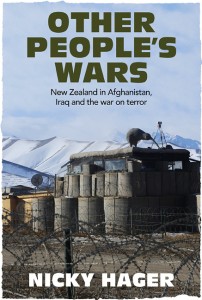
With his previous books ‘Secret Power’, ‘Secrets and Lies’, ‘Seeds of Distrust’, ‘The Hollow Men’ and now ‘Other People’s Wars’ Hager has cemented his place as one of the most important journalists New Zealand has ever produced.
The following is a summary of the key points that Hager makes in his book:
• One of the major themes running throughout the book is the control the military have exerted over the media through public relations methods. Leaked documents show the strategies hatched by the military leadership to keep key events and information from parliament, the media, and the public.
• Right from New Zealand’s first involvement in Afghanistan, confidential critical reports have circulated amongst the defence force concerning the lack of strategy regarding New Zealand involvement in imperialist wars, as well as tactical deficiencies with regard to the New Zealand deployments.
• Primarily New Zealand’s involvement in Afghanistan and Iraq has been motivated by diplomatic, defence, and trade concerns.
• New Zealand’s involvement in the wars has been driven and led by defence staff, with a strong focus on rebuilding what is in effect the ANZUS alliance in all but name.
• Officials and military staff developed a close and tight reign on any negative information coming out of the warzones, they resorted to misleading or outright lying to get a good story.
• New Zealand troops have regularly engaged in combat activity or combat support. This activity was not confined to the SAS.
• New Zealand Navy frigates and Air Force Orions’ were actively involved in supporting the US/UK invasion of Iraq.
• New Zealand’s ‘reconstruction’ efforts in Bamiyan province were at best a fig-leaf and at worst an outright sham. Reconstruction projects were started afresh every 6 months and then left on the wayside with the end of each deployment. The successes hyped up in New Zealand were extremely over-exaggerated or downright lies.
• There were undeclared US intelligence officers in the Kiwi base at Bamiyan who would often debrief New Zealand soldiers directly. New Zealand media were aware of their presence but as a whole, did not report on it, due to the perceived ‘irrelevance’ of raising it.
• Hager has described this as the biggest leak in New Zealand history.
The response to this at Hager’s press conference and afterwards by the media and senior politicians has been illustrative. Guyon Espiner (TVONE political editor) stated that he was not surprised that U.S. intelligence officers were present in the New Zealand Provincial Reconstruction Team base and that he even ate meals with them and was briefed, pledging to keep information secret. He then proceeded to ask Hager if he had gone to Afghanistan, which Hager has not. However Hager’s 1300+ footnotes representing five years of research and interviews has far more authenticity and accuracy when measured against the public relations-parachute-reporting that has characterised the majority of the New Zealand media’s reporting of Afghanistan to date.
Vernon Small in a recent Dominion opinion piece was surprisingly frank when he said that: “In fact, I, and other reporters before me, were introduced to US intelligence and communications staff at Bamiyan and at other Kiwi bases and ate and chatted with them. The stars and stripes flies alongside the New Zealand flag at Bamiyan to advertise the US contingent.”
John Key’s response has been to roll his eyes, rubbish the work on the grounds of its authorship by Hager and state blankly that although he has not read the work, there is no evidence to back up Hager’s claims. This has been an almost carbon copy to his dismissal of Jon Stephenson who is the only other major New Zealand journalist writing independently and critically about New Zealand’s involvement in Afghanistan. The only major difference between Key’s treatment of either journalist is the malice and personal attacks poured on Stephenson.
Phil Goff’s response has not been much better. Refusing to call for an inquiry and describing the book as ‘spurious’, again without reading it. The general response so far from media has been to focus almost entirely on the revelation of the presence of U.S. intelligence officials in the Bamiyan camp, normalising and downplaying the fact by revealing a general knowledge of their presence, justifying it through the nonchalant shrugging of their shoulders at the apparent lack of need to report this to the general public.
Jerry Mateparae, the recent head of the Defence Force, who officially took up the role Governor General on the day of the book’s release, has denied or been unable to recall any of the issues raised in the book. Simon Wilson writing in the Metro (before the publication of the book) wrote, “Mateparae is a former head of the SAS, the Army and the NZDF, and has therefore been responsible, in one capacity or another, for the troops in the field and for advising the government on their activities, for the entire period of the Afghan war.”
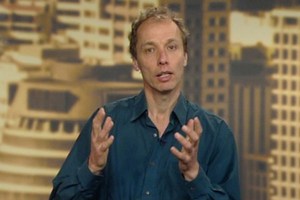
This is an aspect that Hager has talked about. Either senior parliamentarians in both the Labour and National governments lied, or they chose not to know about what was going, or both. The denials by both military and parliamentary figures have been clear to say they did not know about CIA bases. Not that there were not bases, or that they were staffed by intelligence figures, just a very specific, very vague wave-off, that relies on Hager not being able to provide documentation that directly links any of these senior figures to the issues raised. Key himself has been clear to talk about the lack of a “smoking gun” in relation to Hager’s claims.
One of the leaks is a confidential 2010 Defence Force report which said the projects overseen by the Provincial Reconstruction Team “…do not appear to be sustainable in any way”. This is a key aspect behind the change in presentation of New Zealand’s support for imperialist interventions. We are ‘peacekeepers’ who are ‘rebuilding’ in occupied lands, from Bosnia, to East Timor and now Afghanistan and Iraq. The language of intervention, invasion, and occupation has changed and been softened to hide away the realities of New Zealand’s support of American invasions which have killed hundreds of thousands of lives over the past decade. Hager’s meticulous documentation deals a striking blow to this notion. New Zealand’s involvement in Afghanistan is about closer ties to the U.S., it is not about ‘hearts and minds’ or provincial reconstruction, it is about providing intelligence and support for the US bombing and indiscriminate attacks on the Afghan people. When they say that the SAS are ‘mentoring’ Afghan troops it is now clear – even though it was obvious before – that it means being at the front of any attacks or operations, not unlike U.S. ‘observers’ in the Vietnam war.
Fran O’Sullivan, in The New Zealand Herald, wrote that there exists “…a culture of secrecy which means New Zealand journalists can obtain clearer information from military websites overseas than is made readily available at home” and said “… much of the official information which the Labour government chose to publish was hopelessly outdated.”
This is the other important aspect of the story which Hager hasn’t engaged on to the same extent. Namely the co-option of the media (as if they weren’t already coopted to begin with). Every journalist who has spoken of their trips to Afghanistan since the publication of Hager’s book has done so as a defence of the establishment and as an attack on Hager’s credibility. None of them thought that the presence of U.S. intelligence officials camped within the New Zealand base was at all at odds with the ‘peacekeeping’, ‘reconstruction’ public face of the mission. The reality is that the media are no longer reporting on the military but instead reporting for the military.
In part the reason for this is that as mainstream journalists, they are reliant on the government and dominant political parties for stories, gossip, and scoops. If they break this system of patronage, then they lose their place in the food-chain.
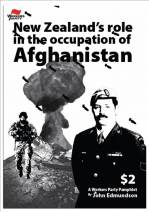
While various governments have not been able to cow either Stephenson or Hager, both journalists stand as a testament to the ostracisation involved when actually holding power to account. The role of people like Richard Long, who moved from Evening Post editorship to being chief of staff to then National Party leader Don Brash as well as the tight links between media, business and the political sphere shown by the fallout from the News of the World scandal in England makes this symbiotic relationship clear.
Since 2001, the Workers Party and its forerunner organisations have joined in the calls and the marches against the war and New Zealand’s involvement, and on occasions the Workers Party has played key organisational and/or political roles in that movement. Clearly Hagar has outlined how the political parties and senior military figures have learnt and developed their public relations strategies and tactics. We need to learn from this in order to counteract government propaganda and whatever other public relations approaches they attempt next.
Links:
Stephen Price is a media lawyer and advisor to Hager, who has written from his perspective on the book and the issues raised.
http://www.medialawjournal.co.nz/?p=498
Selwyn Manning (Scoop Editor) in an interview on the matter on 95BfM as well as an outline of the book/issues itself
http://www.scoop.co.nz/stories/HL1109/S00006/manning-hagers-new-book-new-gov-general-controversies.htm
Audrey Young provides an outline of the story so far from her perspective
http://www.nzherald.co.nz/audrey-young/news/article.cfm?a_id=164&objectid=10748912
Nicky Hager’s press release announcing the publication and release of the book.
http://www.scoop.co.nz/stories/PO1109/S00013/release-of-nicky-hagers-new-book-other-peoples-wars.htm
Journalist Keith Ng focuses on the role in the media, as well as an interesting discussion within the comments section.
http://publicaddress.net/onpoint/other-peoples-wars/
A confrontational interview with Nicky Hager on TV3
http://www.scoop.co.nz/multimedia/tv/national/55767.html
An outline of the press conference and an audio recording of the Q&A after Hager outlined the general issues raised.
http://www.scoop.co.nz/stories/HL1109/S00007/images-audio-nicky-hagers-new-book-other-peoples-wars.htm
Dominion Post Political Editor Vernon Small plays down Hager’s claims and distracts from the core issues raised.
http://www.stuff.co.nz/national/politics/5551660/Little-kept-from-media-eyes-at-base
Zetetic on the Standard focuses on the drivers behind the media herd mentality.
http://thestandard.org.nz/need-to-know/
Summary of the varied responses to Hager’s book
http://www.scoop.co.nz/stories/HL1109/S00010/rnz-audio-reaction-to-new-nicky-hager-book.htm
Gordon Campbell opines on the book and the controversy surrounding it, as well as a video of the press conference.
http://gordoncampbell.scoop.co.nz/2011/09/02/gordon-campbell-on-nicky-hager%E2%80%99s-new-book/
In Hamilton: An evening with a shack-dwellers' movement leader
GLBT campaigning in Wellington – interview with Queer Avengers
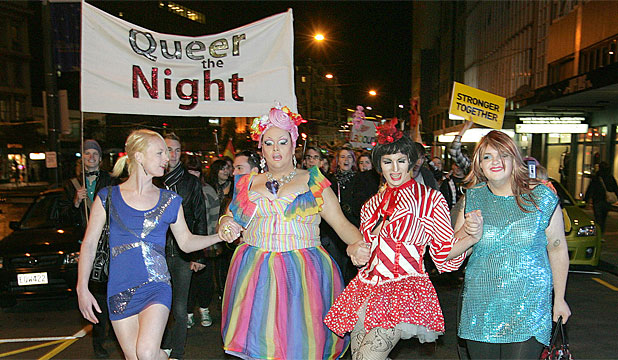
The following interview is with Kassie Hartendorp (Wellington Workers Party branch organiser and Schools Out facilitator and chair of Queer Avengers). And Jason Frock (Wellington Workers Party branch education officer, Schools Out facilitator, and trainee-coordinator of the Wellington Gay Welfare Group and member of the Queer Avengers). Both have been in highly involved in the recent Queer the Night demonstration and in the formation of the Queer Avengers campaign organisation.
The Spark: What was Queer the Night?
KH: Queer the Night was a march organised in response to the day-to-day violence that members of the queer community face while in the streets. The fear of verbal insults and physical attacks is something queers constantly carry with them everywhere.
JF: The streets are especially dangerous places for queers. Twice as much near bars at night which are highly sexualised areas where concepts of ‘masculinity’ need to be protected. They are often impossible to pass without having aninsulthurled your way if you’re visibly gay. It was also becoming normalised in Wellington to have regular queer bashings. Within our own friend networks it was becoming roughly 1 every other month.
KH: The purpose of the march was to call-out the queer community for its general silence towards the pervasive homophobic and transphobic street culture. We wanted people to realise that “enough is enough” and to begin to think about how to collectively organise beyond the march itself and to actually fight our continued oppression.
JF:Homophobic and transphobic violence is something experienced by queer community as a whole, but the responses to it are generally acted upon at an individual level. We wanted to break that atomisation by having a visible, militantand proud march through the centre of town and opening up a place where queers can come together and talk about our social oppression.
KH: What we needed was a celebration, a big bang to break the silence. We needed a powerful event which could break through the general apathy towards collective action. We needed an event which would empower people to take ownership of the queer community.
The Spark: How did the march itself go?
JF and KH: Overwhelming success.
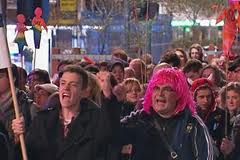 KH: The energy was amazing. For many of us it was the most militant march we’ve been on. There was a good turnout, of about 400 people. The militancy, size and feelwere much greater than the numbers. I’ve been on bigger marches that weren’t nearly as powerful. There were four official guest speakers; all were received well by the crowd. It was a very emotional and raw event. People were crying. Actually making the streets a queer space was a very powerful experience for people.
KH: The energy was amazing. For many of us it was the most militant march we’ve been on. There was a good turnout, of about 400 people. The militancy, size and feelwere much greater than the numbers. I’ve been on bigger marches that weren’t nearly as powerful. There were four official guest speakers; all were received well by the crowd. It was a very emotional and raw event. People were crying. Actually making the streets a queer space was a very powerful experience for people.
Continue reading “GLBT campaigning in Wellington – interview with Queer Avengers”
Victoria university students support Palestinian resistance
Marika Pratley , PFLP Solidarity Campaign Coordinator for Wellington and member of Vic Palestine Group
Over August Vic Palestine Group organised a series of events to create awareness and build support around Victoria University and Wellington for the Palestinian struggle. This included a film screening of Occupation 101, a Student Representative Council (SRC) on the right to education for Palestinians, a panel discussion on Israel and Palestine, and a fundraising gig to prepare for the photography exhibition “Unrecognised”, which is opened on Friday 19 August. Despite Zionists ripping down posters in an attempt to censor the campaign, there has been strong support and all events were well attended.
The SRC happened on the 29th of July in the Victorai University student union building, with over 140 people. The motion was put forward: “To affiliate to the Right to Education Campaign at Birzeit University as a public show of solidarity and support to all Palestinian students and teachers who are struggling to live,work and study under the illegal Israeli occupation.”, as part of the right2edu campaign*
John Minto from GPJA in Auckland was there to talk in support of the motion, and referenced the struggle of abolishing apartheid in South Africa as a reason for supporting the issue. There were also speakers from Vic Palestine, the Greens and other radical left organizations on campus. Debate on the motion was based mostly on people not understanding the need for international solidarity, rather than being Zionist supporters. However the outcome was an overwhelming majority of students in support of the right2edu campaign, and the motion was passed.
The SRC was followed by a panel in the first week of August. Nigel Parsons, a Political Scientist from Massey University opened the panel by discussing the Israel Palestine situation. Dr. Parsons used Foucault’s theory of Bio-politics as a basis fo discussing how the state functions in controlling people’s lives. He then proceeded to apply this through historical development of Israel, and how this control has impacted on the Palestinians as invidividuals and their community as a whole. He went onto discuss how the Oslo agreement relied on incorporating the PLO, leading to the Palestinian Authorities controlling their own resistance, and allowing for the development of settlements in the West Bank. He ended his talk pointing out that when demanding for ‘the right of state’ for Palestinians, its absolutely essential to consider what this means in practice, and what ‘type’ of state the Palestinians would be demanding.
This was followed by Hone Fowler from Kia Ora Gaza. He gave a skype presentation of photos from the Kia Ora Gaza convoy that visited Palestine in December last year, with other international organizations. Kia Ora Gaza are organising another group to go at the end of 2011 and are looking for volunteers.
The final part of the panel was presented by Nadia Rhiannon from Vic Palestine. She focused her talk on the experiences of Palestinian youth, and how they relate to the occupation. This included accounts of people in Palestine as well as her own experiences, being apart of the Palestinian diaspora that were born and raised outside of Palestine. She included example of how her cousin fell in love with an Israeli Conscientious objector, and what it feels like to have a displaced identity due to the denial of rights for the Palestinian community.
The final part of the Palestine Solidarity fortnight was a fundraising gig at Garett street in Wellington. This was done on behalf of the Concerned Citizens, to fundraise for a photo exhibition, which is intended to raise awareness of the UN meeting in September, which will decide whether or not Palestine will be recognized as a state. The photo exhibition is opening tonight in Wellington, and will be in the following cities on these dates.
Wellington – Garrett Street: 19th – 21st August
Dunedin – Tangente Cafe: 19th – 21st August
Hamilton – The Void: 19th – 21st August
Whanganui – The Arc Theatre: 19th – 21st August
Auckland – Te Karanga Gallery: 22nd August – 1st September
Gisborne – Dome Cinema: date TBC
East London (South Africa) – Nelson Mandela Metropolitan University: August-September
*Further information can be found at http://right2edu.birzeit.edu/
Workers Party news and activities from around the country
By writers for The Spark
Workers Party members and branches were active in a range of events in July. In mid-July the Wellington branch had a good independent presence on semester two orientation day at Victoria University. This led into another event on Sunday July 17 – the Big Left Radical Fair – which was held at Crossways Community Centre in Mt. Victoria, Wellington. Workers Party member Joel Cosgrove who has helped to form ‘Mutiny’ – a local left networking group – was a key organiser of this event. It was attended by approximately 200+ people and 15 local organisations, including Palestine solidarity groups (Popular Front for the Liberation of Palestine Solidarity Campaign, Wellington Palestine Group, and Students for Justice in Palestine), climate change groups, and other Marxist and anarchist groups.
For many of the people who attended this event it was their first exposure to radical politics. Cosgrove gave a speech on the topic ‘What is the Workers Party?’ The Queers Avengers – a recently formed GLBT group in which Workers Party members are participating – was another organisation that was represented at the fair (see interview page 8).
Also on Sunday July 17 Workers Party members in Hamilton and Auckland, plus party contacts/supporters, met for a day of study and political discussion. For the first part of the day the group studied a small work by American Marxist leader James P. Cannon. This was followed by an appraisal of the situation of the Workers Party in New Zealand and subsequent discussion. Time was assigned for the Mana Party/Movement to be discussed in the final session for the day. This was a serious political discussion about the political nature of the Mana Party and its class composition. The discussion also touched on aspects of Marxism and Maori liberation. It was very interactive as between six and eight young Mana activists asked if they could join in the discussion.

In Auckland and Hamilton Workers Party members have become involved in the Mana Party/Mana movement. In June of this year Workers Party members resolved that Mana is a Maori-led working class movement that our members would engage with in a constructive manner. In Auckland that has meant door-knocking and contributing towards policy ideas. In Hamilton Workers Party members and some rank-and-file workers are going about forming a workers’/socialist branch in Hamilton West with a view and proposal to look after Mana activity on a weekly basis at the Frankton markets and as such have been involved in Mana Hauraki/Waikato formative meetings so far, with one member being elected to the interim committee of that branch. Workers Party members in Hamilton also helped to organise for a GPJA-initiated (Global Peace and Justice Auckland) public meeting at the 30th anniversary of the anti-apartheid protest in Hamilton which stopped the game between the All Blacks and South Africa.
Auckland activist and musician Matt Billington played his Myth of Democracy acoustic set in Hamilton as a fundraiser for the Workers Party.
Byron Clarke has again been elected as branch organiser for the Workers Party’s Christchurch branch. Activity in Christchurch has continued to be limited because of the earthquakes and the heavy snowfall in the area.

